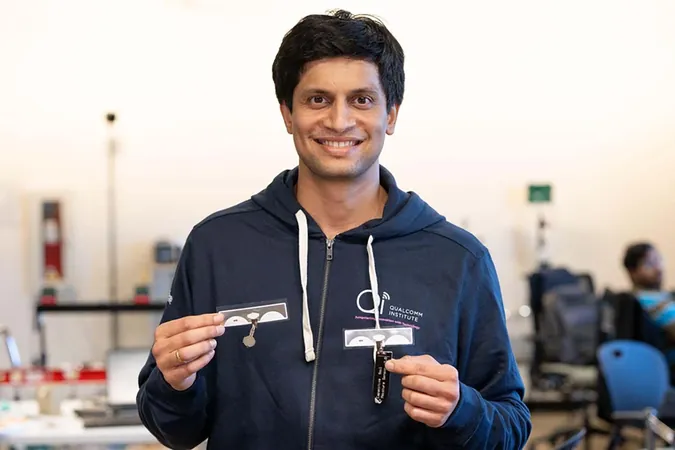
Revolutionizing Data Collection: Battery-Free RFID Tags Open New Frontiers in Sensing and Tracking
2024-11-05
Author: Sarah
In a world where data reigns supreme, the latest advancements in technology are making waves that could redefine how we interact with our environment. Dinesh Bharadia, an associate professor at UC San Diego, emphasizes the pivotal role of data in the next decade, likening it to the "silicon" of the previous era. As the Internet of Things (IoT) continues to expand, a groundbreaking approach has emerged, allowing for efficient sensing and tracking that requires no traditional power sources.
The Marco Polo of Passive Sensing: RFID Tags
Under the guidance of Bharadia, lead author Nagarjun Bhat is pioneering research showcased at the 22nd ACM Conference on Embedded Networked Sensor Systems (SenSys 2024) in Hangzhou, China. Bhat's innovative approach revolves around repurposing Radio Frequency Identification (RFID) tags—small, cost-effective devices traditionally used for inventory management in retail and contactless payments—for battery-free sensors capable of real-time environmental monitoring.
Typically, the current passive sensing mechanisms rely heavily on complex analog-digital converters, rendering them inefficient and power-hungry. The research team sought to simplify these systems by using off-the-shelf RFID tags to sense parameters like temperature and humidity without the burden of bulky battery systems.
Breaking Through the Barriers of Traditional Sensors
Previously, developing efficient low-power sensors often meant employing integrated circuits that were costly and cumbersome. Bhat expresses the limitations of such digital sensors, particularly highlighting their inability to provide timely insights. For example, in biomedical applications, accessing vital data such as heart rate could take as long as 10 minutes through current systems—an eternity in critical situations.
In contrast, Bhat and Bharadia's RFID-based analog sensors directly detect environmental stimuli, converting voltage changes into wireless signals for immediate processing. This leads to real-time data transmission without the need for intricate hardware setups.
Transformative Applications Across Industries
The implications of this technology are vast and exciting. Agricultural sectors stand to benefit significantly from Bhat's innovations. Current irrigation practices often involve a few large sensors, compromising the data's granularity. By deploying RFID-enabled soil moisture sensors, farmers can gather precise data across smaller areas, optimizing water distribution based on real-time conditions.
Moreover, athletes can leverage these battery-free sensors to enhance their training regimens. Instead of relying on expensive facilities for force plate testing, Bhat proposes integrating RFID sensors directly into athlete footwear to measure jumping force, making performance evaluations more accessible.
Parking management also enters a high-tech era with RFID tags. By embedding these sensors in parking spaces, operators can easily track occupancy in real-time, alleviating the frustration of searching for available spots in busy garages.
Bridging to a Data-Driven Future
The future of data collection is primed for transformation, especially as Artificial Intelligence (AI) becomes increasingly pervasive. Bharadia notes that AI thrives on data gathered from sensors like those developed by Bhat. The potential applications of this technology extend far beyond the current uses, paving the way for a new generation of data collection and analytics.
As we stand on the threshold of this technological revolution, the democratization of data through battery-free, cost-effective RFID sensing could empower industries across the board—from agriculture to fitness to urban planning. With researchers like Bhat and Bharadia leading the charge, we're bound to witness a wave of advancements that will redefine how we gather and utilize data in our daily lives.

 Brasil (PT)
Brasil (PT)
 Canada (EN)
Canada (EN)
 Chile (ES)
Chile (ES)
 Česko (CS)
Česko (CS)
 대한민국 (KO)
대한민국 (KO)
 España (ES)
España (ES)
 France (FR)
France (FR)
 Hong Kong (EN)
Hong Kong (EN)
 Italia (IT)
Italia (IT)
 日本 (JA)
日本 (JA)
 Magyarország (HU)
Magyarország (HU)
 Norge (NO)
Norge (NO)
 Polska (PL)
Polska (PL)
 Schweiz (DE)
Schweiz (DE)
 Singapore (EN)
Singapore (EN)
 Sverige (SV)
Sverige (SV)
 Suomi (FI)
Suomi (FI)
 Türkiye (TR)
Türkiye (TR)
 الإمارات العربية المتحدة (AR)
الإمارات العربية المتحدة (AR)